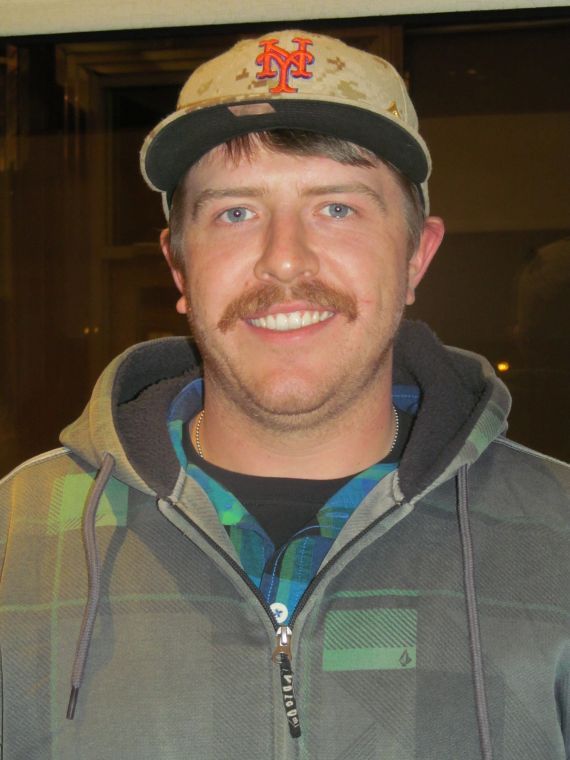
When Williston Park native Daniel Cribbin decided to enlist in the U.S. Marines after graduating from Mineola High School in 2006, he was carrying on a legacy his grandfather left him as a World War II veteran.
“College wasn’t for me,” Cribbin said. “My grandfather was a Marine. He was at Bougainville and Guadalcanal.”
His grandfather, John, never spoke about his experiences in the brutal combat of the Marines’ island-hopping campaign in the South Pacific, Cribbin said,.
But, he said, he admired his grandfather’s service in a war that he feels saved the world.
So he enlisted in the Marines in June 2007 at age 17 seeking to serve in both Iraq and Afghanistan.
A heavy equipment operator assigned to a communications battalion in Iraq in July 2009, Cribbin’s first mission was to move equipment and prepare convoys to transport military gear.
“It was hairy. Within a week in country, I was on my first convoy. You don’t know what’s going to happen. You can barely see the road,” Cribbin said.
Convoys moved at night, he said.
He said he recalls riding into Fallouja at night, long after the Marines’ intense battle to “demilitarize” the area, and bouncing along in the truck in which he was riding as it went over artillery craters in the road.
In improvised explosive device training, he said, he was instructed to keep an eye on anyone watching him.
So, he said, “it was a little unnerving” seeing Iraqis sitting by the roadside in Fallouja, focused on the passing convoy.
He said the confidence of veteran Marines in the convoy helped sustain him.
He said he was in only one convoy during his six months in Iraq in which a vehicle was struck by and improvised roadside bomb. But the threat was always present.
While Cribbin’s mission was primarily a logistical one, he handled .50 calibre and 762-millimeter M60 machine guns as a turret gunner while riding in convoys. On several occasions, he said, those convoys came under enemy fire and he returned fire.
He said machine gun duty was especially nerve wracking. A turret gunner, he said, isn’t always being able to return fire, depending on the direction it’s coming from. But when he did fire his weapons, he said, the experience was memorable.
“There’s a big rush. There’s nothing like that in the world. It’s them or you,” Cribbin said.
Cribbin returned from Iraq in January 2009 and was subsequently offered a posting for embassy security offered only to combat veterans. But he chose to return to the field with his unit and was deployed in
Afghanistan in March 2010 on a one-year tour of duty.
“I didn’t want to leave my guys,” Cribbin said. “I thought it was much more important to step into that [World War II] generation’s shoes, becoming part of two-war generation.”
Afghanistan proved to be a different – but no less dangerous – experience. Cribbin’s unit was a brigade combat team that was part of a headquarters group, supplying and expanding Marine outposts.
“Our new mission was to secure the [Marines] mission outposts,” he said.
While he said operations in Afghanistan seemed “smoother,” the environment was a foreboding one. Marines referred to the country’s desert sand as “moondust” because of its very fine quality that produced clouds of dust from convoys moving through it.
“Driving with convoys in Afghanistan, unless you were in the lead truck, you couldn’t see s—t,” he said.
There was a sharp difference between Iraq, where he said people were more “cultured” and the more tribal Afghan people who were frequently illiterate. There were also no rules of the road, with vehicles often moving in three different directions on the same road.
But one thing didn’t change significantly in military operations from one country to the other.
“Nothing goes according to plan. Everything that can, would go wrong,” Cribbin said.
He remembered riding near the tail end of one convoy riding through an Afghani city when the front end of the convoy halted, leaving his vehicle directly under a four-story building.
“Somebody could drop a bomb on us,” he recalled thinking.
At the end of his tour in Afghanistan, he said, he was given less than the requisite 90 days to “decompress” before flying back to the U.S. and the transition was a traumatic one.
“They train you to be a killing machine. Then you come back and you’re supposed to be docile,” he said. “For the longest time, I didn’t know how I would react to the situation when I got back home.
Upon arriving home in June 2011, he received an unexpected shock.
The second day after he returned, he said, his father, Timothy, was admitted to Memorial Sloan-Kettering Cancer Center in Manhattan for treatment. He never left the hospital and died two months later.
“Not being able to talk to my dad took a toll on me,” he said.
He said he eventually started abusing alcohol heavily and spent a week in a veterans hospital being treated for post traumatic stress syndrome.
Cribbin said his re-entry into civilian society has been helped by the friends he’s made after joining Adolf Block VFW Post 1305 in Mineola earlier this year.
“It’s been a great experience,” he said.
He said he is coping with the stress, living in Mineola where he had been a Boy Scout in Troop 45 in younger days, close to his family in Williston Park. He is working an associate’s degree in criminal justice from Nassau Community College.
He’s also hoping to join the Operating Engineers Union in New York City, doing work similar to what he did while in the Marines.
He said he has no second thoughts about the time he spent in the Marines.
“I wouldn’t trade the experience for anything,” he said. “You meet the greatest bunch of guys.”
Cribbin said he’s maintained many of his Marine friendships through Facebook and expects those relationships will endure over time.






